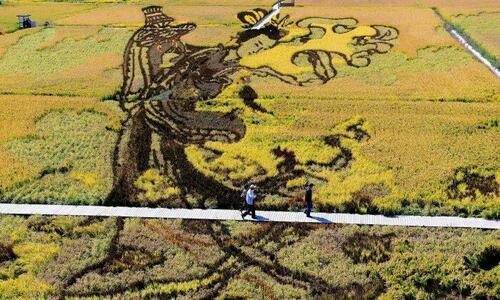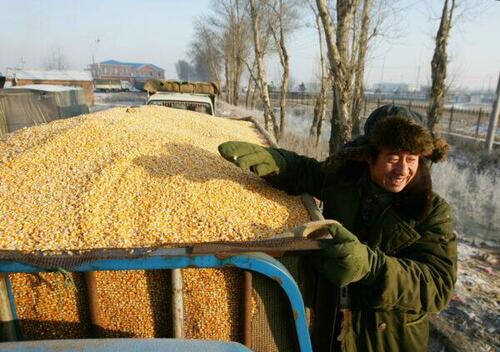
Authored by Mary Hong via The Epoch Times (emphasis ours),
The fertile black soil in northeastern China, which the Chinese grain community relies on, is in an alarming state of degradation due to over-use. Chinese researchers recently admitted that the area has lost a huge chunk of its productivity.
It is the most important grain commodity base in China, affecting the country’s food security. This grain field is over 107 million acres, which is one-fifth of China’s arable land; the rice production accounts for at least a quarter of China’s total grain crop.
That is, this land affects the food reserves that matter to hundreds of millions of people in China.

Alarming Soil Degradation
On June 15, researchers at the Chinese Academy of Sciences (CAS) said that the rich black soil in the northeastern region has lost 20 percent of productivity, the Chinese media reported.
Significant loss of soil and the organic nutrients in the soil from excessive use of the land are the main causes of the decreased productivity, said the report that came after an inspection by a regime high official.
Li Zhanshu, chairman of the Party’s Standing Committee, led the inspection of the environmental protection in the northeastern province, Heilongjiang, from June 10 to 13.
Li emphasized the importance of sustaining the black soil belt, according to the report by state mouthpiece, CCTV, on June 14.
In fact, China has been continuously losing its rich and fertile black soil for decades. Heavy mechanization and fertilizer use since the early 20th century under the regime increased productivity but also caused tremendous damage to the rich soil.
In 2021, the Chinese Academy of Sciences (CAS) released its first “White Paper on Black Soil Region in Northeast China, 2020.”
The white paper revealed that in the past 60 years, the organic content of the black soil tillage layer has dropped by 33 percent, and in some areas by 50 percent.

Black Soil is Poor Farmers’ Easy Money
To protect the black soil, the regime intends to stipulate heavy punishment for illegal black earth trading and theft. However, as the local poor farmers know, the black soil is black gold—easy money for them. The illegal trading of black soil inside China has formed a highly profitable industrial chain.
For instance, state mouthpiece Xinhua News reported in 2021 a case of illegal black soil trade covering more than 27 acres of soil that generated $53,000.
Considering the fact that any industrial chain would not get an easy pass without the Communist officials’ recognition and protection, whether the newly stipulated regulation will have any effect remains to be seen.
Authored by Mary Hong via The Epoch Times (emphasis ours),
The fertile black soil in northeastern China, which the Chinese grain community relies on, is in an alarming state of degradation due to over-use. Chinese researchers recently admitted that the area has lost a huge chunk of its productivity.
It is the most important grain commodity base in China, affecting the country’s food security. This grain field is over 107 million acres, which is one-fifth of China’s arable land; the rice production accounts for at least a quarter of China’s total grain crop.
That is, this land affects the food reserves that matter to hundreds of millions of people in China.

Alarming Soil Degradation
On June 15, researchers at the Chinese Academy of Sciences (CAS) said that the rich black soil in the northeastern region has lost 20 percent of productivity, the Chinese media reported.
Significant loss of soil and the organic nutrients in the soil from excessive use of the land are the main causes of the decreased productivity, said the report that came after an inspection by a regime high official.
Li Zhanshu, chairman of the Party’s Standing Committee, led the inspection of the environmental protection in the northeastern province, Heilongjiang, from June 10 to 13.
Li emphasized the importance of sustaining the black soil belt, according to the report by state mouthpiece, CCTV, on June 14.
In fact, China has been continuously losing its rich and fertile black soil for decades. Heavy mechanization and fertilizer use since the early 20th century under the regime increased productivity but also caused tremendous damage to the rich soil.
In 2021, the Chinese Academy of Sciences (CAS) released its first “White Paper on Black Soil Region in Northeast China, 2020.”
The white paper revealed that in the past 60 years, the organic content of the black soil tillage layer has dropped by 33 percent, and in some areas by 50 percent.

Black Soil is Poor Farmers’ Easy Money
To protect the black soil, the regime intends to stipulate heavy punishment for illegal black earth trading and theft. However, as the local poor farmers know, the black soil is black gold—easy money for them. The illegal trading of black soil inside China has formed a highly profitable industrial chain.
For instance, state mouthpiece Xinhua News reported in 2021 a case of illegal black soil trade covering more than 27 acres of soil that generated $53,000.
Considering the fact that any industrial chain would not get an easy pass without the Communist officials’ recognition and protection, whether the newly stipulated regulation will have any effect remains to be seen.





